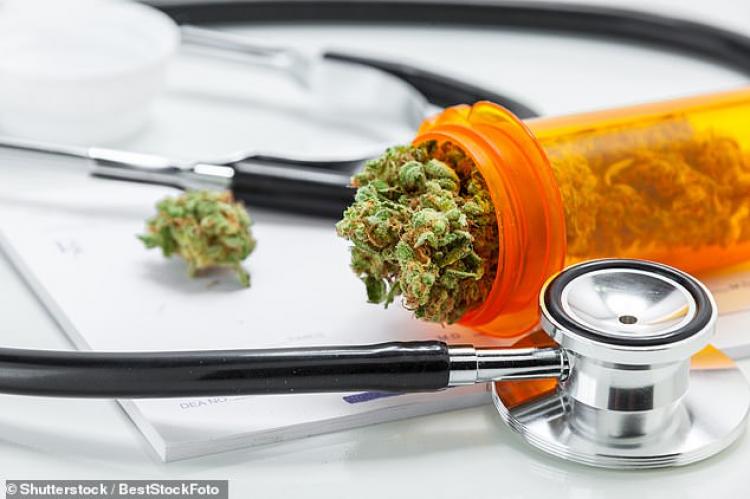Medicinal cannabis is to be given to 20,000 British patients in first major trial
Medicinal cannabis will be given to 20,000 British patients in first major trial of drug's impact - a year after it was made legal on the NHS
- Project, named Twenty21, was launched yesterday and will run until end of 2021
- To test impact on chronic pain, MS, epilepsy, PTSD, Tourette's, anxiety, addiction
- Medical marijuana been legal since last November but impossible to get on NHS
Thousands of patients are to be given cheaper medicinal cannabis in the UK's first major trial of the drug's effect.
Medicinal cannabis was legalised in Britain last November but patients have found it almost impossible to access it on the NHS.
Medicines derived from the drug are not routinely available on the health service because of concerns not enough research has been done into its benefits.
Patients have had to either source the drug illegally or fork out thousands of pounds a month for a private prescription.
But the new study, named Project Twenty21, will subsidise cannabis for up to 20,000 patients to test its impact on seven conditions.
They include chronic pain, multiple sclerosis (MS), epilepsy, post-traumatic stress disorder (PTSD), Tourette's, anxiety and drug addiction.
Data will be collected every three months on the drug's efficacy, safety and patient-reported feedback.
Professor David Nutt, from the charity Drug Science, which launched the project on Thursday, said the trial would 'provide a solid clinical database for other medical prescribers to build on'.
He told Sky News: 'I believe cannabis is going to be the most important innovation in medicine for the rest of my life. Cannabis medicines can be life-saving in disorders like severe childhood epilepsy.
'There are children who have died in this country in the last couple of years because they haven't had access to cannabis. It's outrageous, it's unnecessary and we want to rectify it.'
Chloe Sakal, director of Project Twenty21, told the Pharmaceutical Journal: 'Medical cannabis has been legal to prescribe for a year now; one of the reasons we’re doing this is to help clinicians feel supported.
'We get requests from doctors every day saying they want to use it with their patients, but they don’t know how to write the prescription.
'We want them to feel like it’s OK [to prescribe medical cannabis] and that they’re supported [to do so].'
She added that Drug Science was 'working hard to make it affordable'. Negotiations remain ongoing as to how much it will cost patients.
Murray Gray, six, suffers from intractable epilepsy which caused him to have more than 600 micro seizures a day.
He spent almost his entire life in hospital and was forced to wear a protective helmet around the clock whenever he was allowed home.
His mother Karen said he was prescribed tens of pharmaceutical drugs, all of which had no effect on reducing his jerks.
But after getting their hands on a private cannabis prescription, he has been seizure-free for 11 weeks and no longer needs his helmet.
But, despite tales like Murray's, there is a great deal of scepticism around the efficacy of medical cannabis.
The clinical watchdog NICE said it should not be prescribed for a range of medical conditions because there is a lack of concrete evidence it works.
But the Twenty21 project has been backed by the the Royal College of Psychiatrists (RCP).
Professor Wendy Burn, president of the RCP, said: 'The College welcomes this pilot project which it hopes will make an important contribution towards addressing the paucity of evidence for the use of cannabis-based medicinal products.
'We hope that this pilot, along with other research such as more much-needed randomised control trials, will continue to build the evidence.'
Tales of families forking out thousands of pounds to pay for private prescriptions and travelling abroad to bring cannabis oils back for their children were what persuaded the Government to legalise them last November.
Cases such as those of Billy Caldwell, 13, and Alfie Dingley, seven, highlighted the benefits of cannabis oil to children with epilepsy who suffer multiple seizures.
But since then, Billy and Alfie remain the only two children to have managed to get a prescription on the NHS.
Children suffering from severe, life-threatening seizures were dealt a huge blow in August when the NHS watchdog ruled against prescribing medicinal cannabis for their conditions.
- Log in to post comments

